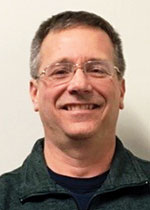Corrections Corner / Deacon Marc Kellams
Incarceration is topic of Oct. 9 corrections conference
 I highly recommend that those interested in prison and jail ministry read Waiting for an Echo: The Madness of American Incarceration, written by Dr. Christine Montross.
I highly recommend that those interested in prison and jail ministry read Waiting for an Echo: The Madness of American Incarceration, written by Dr. Christine Montross.
(Related story: Author to discuss ‘madness’ of incarceration at Oct. 9 conference)
An associate professor of psychiatry and human behavior at the Warren Alpert Medical School of Brown University in Providence, R.I., where she graduated, Montross is also a practicing in-patient psychiatrist who performs forensic psychiatric examinations to determine if an inmate has the comprehension to stand trial. She gives a professional opinion to the court of whether a defendant has a sufficient ability to consult with his or her lawyer with a reasonable degree of rational understanding, and can appreciate and understand the charges pending and has a rational as well as a factual understanding of the proceedings.
The book gives an in-depth look at inmates who suffer from a mental illness and end up in American jails and prisons. It analyzes the policies that have criminalized mental illness and have incarcerated those who would be better served in a therapeutic setting.
The conclusion Montross reaches is that “our methods of incarceration take away not only freedom, but also selfhood and soundness of mind. In a nation where 95% of all inmates are released from prison and return to our communities, this is a practice that punishes us all.”
As a society, we must ask ourselves if we want those with mental illnesses imprisoned at all. And if they are, do we want those prisoners released who have their mental illnesses under control? Or do we want them released back into society in a worse mental health condition than when they went in, and thus be prone to recidivate?
The Indiana Department of Correction (IDOC) defines recidivism as a return to incarceration within three years of release. Of all offenders who recidivated in Indiana in 2020, approximately 34.7% returned to IDOC because they committed a new crime, and approximately 65.3% returned for a technical rule violation of post-release supervision. Those with mental health conditions are primarily in the second category.
In the introduction to the book, Montross describes—what would be true for most of us—that she had no real sense of what correctional facilities are like.
We can logically know that a prison setting is not pleasant, and we can surmise what it must be like to be locked up away from family and friends and any support mechanism that we had relied upon.
But the first time we step into a prison and hear the prison door slam behind us, and we experience firsthand its bleak surroundings, its smells and loud noises, only then can we begin to truly appreciate the utter sense of loneliness and loss of freedom that a prisoner is resigned to live with.
The fifth annual Corrections Ministry Conference is scheduled from 8:30 a.m.-3:30 p.m. on Oct. 9 at the Roncalli High School Auditorium, 3300 Prague Road, Indianapolis. Montross is our keynote speaker, and admission is free. The conference will also be livestreamed. Registration is required at www.archindy.org/corrections.
(Deacon Marc Kellams is the Coordinator of Corrections Ministry for the Archdiocese of Indianapolis. He can be reached at mkellams@archindy.org or call 317-592-4012.) †
 I highly recommend that those interested in prison and jail ministry read Waiting for an Echo: The Madness of American Incarceration, written by Dr. Christine Montross.
I highly recommend that those interested in prison and jail ministry read Waiting for an Echo: The Madness of American Incarceration, written by Dr. Christine Montross.